
![]() Tar Daddoo
Tar Daddoo
11/12/2013
![]()
What is the Science Fiction Premise?
A Time of Changes portrays a world in which society is organized to promote self-effacement and inhibit recognition and exploration of one's self.
Is the science of the premise explored?
While the reasons for developing a self-effacing society must be inferred, the consequences for everyone's lives are presented in detail. Personal pronouns -- "I", "me", "my", etc. -- are taboo. Proclaiming one's strengths, virtues, or accomplishments is taboo. Bemoaning one's woes is taboo. To provide a release for all this self-denial, the society provides two options:
These societal constraints and mechanisms are embodied in the Covenant, a sacred document of social engineering, bequeathed to the inhabitants of the planet centuries earlier by their ancestors who left Earth to colonize the planet.
Is the impact of the premise on an individual explored?
The story is all about one individual who strays from the Covenant.
Is the impact of the premise on society explored?
The impact of the Covenant on this society is revealed in two ways. First, since the inhabitants of the planet came from Earth, it is reasonable to consider the ways in which this society differs from our own. Second, as the main character strays from the Covenant, we learn both why he believes the Covenant's constraints are bad and how the society mobilizes to oppose him.
How well written is the story?
The book is quite easy to read and it is relatively short.
That said, I did feel it took a little long for the story to get going as the main character introduced himself and his society through a sequence of not altogether relevant events. Moreover, the ultimate message of the book is a bit muddled both because of the manner in which his liberation is achieved and some unexplained and unexplored negative consequences that accompany that liberation.
Can I recommend the book?
Published in 1971, during a period of sexual and drug exploration in American society , A Time of Changes focuses on themes of mental and emotional imprisonment that were common among the counter-culture of the time. In that view, our society was training us to be conforming automatons by keeping us apart from one another. Through sex and drugs, we could break this cultural programming and achieve a more enlightened state. This is the backdrop for the book and it is definitely a product of its time.
I was also a product of those times. Though not really part of the counter-culture, I can see where A Time of Changes is coming from. My problem is that if I view the book through that lens, I find it wanting. Yes, the society of the Covenant is oppressive, but it is not obviously evil. Yes, the main character makes a strong argument for change, but his argument is marred by his own actions and the negative outcomes they sometimes produce. Yes, the Covenant seems overly restrictive, but the argument in favor of the Covenant is never really made by anyone.
I believe the author wants us to view A Time of Changes through this counter-culture lens and appreciate it for its portrayal of a stagnant and stultifying society. I found it more interesting to approach the book like an anthropologist and avoid judging the society by my standards.
Viewed this way, the society of the Covenant is simply another attempt by mankind to formulate a way to live together, while avoiding the errors of the past. It is not intrinsically good or evil. The main character's departure from the societal norm is interesting for the ways in which it is tolerated and the ways in which it is opposed. The main character's perception of a better way is simply his perception and cannot be taken as an absolute judgment on the society. Like all individuals, he rationalizes his beliefs by emphasizing the good in his actions and ignoring the bad.
This more anthropological approach leaves us with a more ambiguous story in which we worry less about whether the society of the Covenant is right or wrong and more about whether the main character's actions were right or wrong. It is a disquieting point of view, especially because the story does not answer this question. Nevertheless, I think this is a more fruitful way to appreciate what Silverberg has provided.